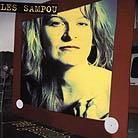October 1999
Her singing and guitar accompaniment exude confidence -- a command of the material impressive in a first collection and indicative of much performing experience. A key contributor to the musical pleasure Les Sampou delivers is Adam Steinberg, with so many instrumental credits on some of the songs that as a child he seems to have gone to the music store instead of school. "Hanging by a Thread," for example, features him on guitars, lap steel, bass, drums, and percussion. On "I Want You," he plays bass, 12-string and electric guitars, organ, and tambourine. Most of the tracks have full (but never gaudy or overblown) rock instrumentation -- guitar, bass, drums, sometimes keyboard. "Happy Anniversary," however, centers on a fingerpicking phrase reminiscent of Joni Mitchell’s first two albums, though other instruments come in and at times cover it over. The next song, "Afraid of the Dark," has Bonnie Raitt written all over it; I wouldn’t be surprised to find it on a CD by the veteran someday. "Baby," which follows, builds on a simple, slow, steady piano line reminiscent of Mitchell’s "The River." It is not to the CD’s detriment that Sampou’s lyrics also hint at these two artists, though most Raitt songs are written by others and Sampou writes all of her own. "Happy Anniversary" begins, "I watch you chase the parakeet escaping through the grass/Pitifully flapping within inches of your grasp" -- not unlike Mitchell’s exotic type of image. The refrain of "Afraid of the Dark" goes, "Tell me lover, are you feeling rattled by desire burning deep within your heart/It ain’t easy waiting in the shadows when you’re afraid of the dark." You’d swear you’ve heard Raitt belt it out somewhere on one of her many albums. The key lyrical strength of Sampou’s songs individually -- the "raw emotion to pen and paper to voice to ears," the "healing -- a howling healing … roaring rehabilitation through despair to discovery" praised in the CD’s liner notes (though songwriters don’t usually write them out before singing and playing them) -- is what I find to be a key weakness when hearing all of the songs together, a problem much more ubiquitous in Raitt’s than in Mitchell’s work: a constant focus on personal emotions without implicit or explicit connection to the world of ideas or sociopolitical phenomena beyond the individual human being. Put in terms of the tradition Sampou is working in, as the liner notes point out: "[e]ver since Bob Dylan came along people have been saying, ‘listen (sic) to the words, listen to the words, the words are really cool.’" But Dylan made words cool precisely by getting beyond personal gropings for love and self-understanding. Even though singer-songwriters of recent decades have written much more interesting, insightful, and metaphorical lyrics about emotions than the "stable" writers who preceded Dylan, the success of the truly accomplished ones is attributable to their songs’ references to and discussions and exposÚs of the larger world outside. With Dylan, that is obvious. Mitchell’s "Both Sides Now," "Chelsea Morning," "Big Yellow Taxi," "Woodstock," and "Banquet" begin a much longer list. James Taylor, Cat Stevens, Joan Armatrading, Lou Reed, Gordon Lightfoot, Tracy Chapman, and the handful of other excellent singer-songwriters further illustrate the point. More recently, so does Tanya Savory, whose Town to Town I reviewed last month. Though her range of topic is somewhat narrow, at least she explores topics, providing breadth and depth through concrete details, not only her emotions. That is not to say emotions are unimportant, just that, to fully succeed, art must transcend them and communicate as well as express. Because Sampou has so much talent, I look forward to hearing more, especially if she can apply her insight to the world beyond the self -- to the big stuff writers traditionally have helped us grapple with. GO BACK TO: |
 Les Sampou - Les Sampou
Les Sampou - Les Sampou
![[Reviewed on CD]](../format/regcd.gif) Les Sampou’s self-titled CD demonstrates a lot of talent for songwriting
and performing. Sampou is an expressive singer, her influences ranging from Bonnie Raitt
to Joni Mitchell -- from familiar blues vocalizing to idiosyncratic techniques of phrasing
and intoning. Her wide range of rhythm, tempo, and melody -- creative use of melody is a
special strength of Sampou’s -- provide variety without producing chaos.
Les Sampou’s self-titled CD demonstrates a lot of talent for songwriting
and performing. Sampou is an expressive singer, her influences ranging from Bonnie Raitt
to Joni Mitchell -- from familiar blues vocalizing to idiosyncratic techniques of phrasing
and intoning. Her wide range of rhythm, tempo, and melody -- creative use of melody is a
special strength of Sampou’s -- provide variety without producing chaos.